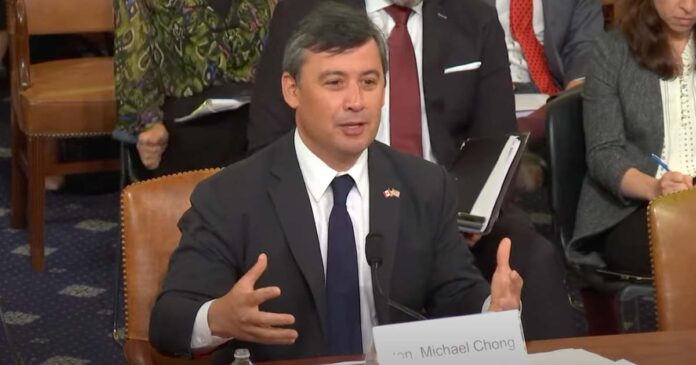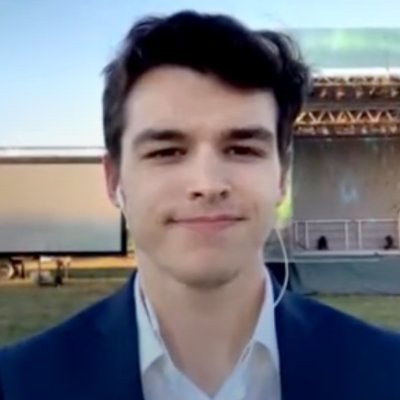Conservative MP Michael Chong testified before U.S. lawmakers on Capitol Hill Tuesday on the subject of Chinese foreign interference efforts in Canada and the intimidation campaign waged against his family in Hong Kong after speaking out against the regime.
Since his appointment as the Conservative foreign affairs critic in 2020, Chong has been one of the most outspoken members of parliament against China’s interference in Canada and of China’s human rights abuses of its own citizens.
In November of 2020, Chong introduced a successful motion in the House calling on the Canadian government to form a robust plan to combat China’s growing foreign operations in Canada and its increasing intimidation of Chinese-Canadians living in Canada.
Chong followed that up by a introducing a motion later that year calling on the government to label China’s treatment of the Uighur minority in Xinjiang as a genocide.
China retaliated against Chong by targeting his family.
In May, Chong was briefed by Canadian intelligence officials that a Chinese diplomat based in Toronto had, since 2020, been gathering information to intimidate Chong’s relatives living in Hong Kong. Last month, Chong was briefed again, this time informing him that he was the target of a Chinese disinformation campaign on the social media platform WeChat.
“My experience is but one of many examples of Beijing’s interference in Canada,” Chong said in his opening statement to Congress. “Many other cases go unnoticed and the victims suffer in silence.”
Chong then turned his focus to informing U.S. lawmakers of the numerous tactics employed by the CCP to intimidate the Chinese diaspora community living in Canada.
One tactic, as Chong explained, is to target Chinese international students, “coaching them into participating in foreign interference threat activities on university campuses, such as targeting pro-Hong Kong democracy activists and Tibetan and Uighur human rights campaigners.”
Chong described China’s intimidation campaigns against international students as a “systemic, long term effort to create fear.”
Other tactics Chong outlined in his opening remarks include the targeting of Chinese-language media, the establishment of Chinese police stations on Canadian soil, the arrest and detention of Canadians in China and by coercing Chinese Canadians into returning to China by creating wanted lists and bounties for their arrest.
“These tactics cannot be tolerated in a free and sovereign country,” Chong said.
In response to a question about corporate espionage from Rep. Ryan Zinke (R-Mon.), Chong outlined how Canadian intelligence views China as “a threat in two ways, in five areas.”
“They are a threat to our national security, and they are a threat to us in the form of theft of intellectual property,” Chong said.
The five “sensitive areas of research and development” at Canada’s leading universities and companies according to Chong are in telecommunications, quantum computing, artificial intelligence, bio-pharma and clean technologies.
Besides providing his intimate understanding of Chinese interference tactics to U.S. lawmakers, Chong’s congressional testimony appeared to be as much about promoting collaboration between Canada and the United States in order to combat Chinese interference, as much as it was about sharing his own experience and knowledge of China’s malign tactics.
Chong’s loudest call for collaboration between the United States and Canada was to urge both countries to end global supply chain reliance on Chinese energy and critical minerals by bringing Canada’s vast supply of natural gas to global markets.
Chong also urged lawmakers to share legislative best practices with Canada on the creation of a foreign agent registry – something the Trudeau government has been widely criticized for failing to implement.
Furthermore, Chong urged Canada and the United States to publicize intelligence about Chinese interference efforts to better inform citizens on both sides of the border as to how China seeks to meddle in their lives.
When it comes to how both Canada and the United States fund research and development projects, Chong testified that granting councils need to immediately stop funding research projects with entities affiliated with China’s People’s Liberation Army.
Last week, after months of sustained calls from opposition parties, the federal government announced the establishment of a formal inquiry to investigate election interference.
Rather than focus solely on Chinese-led election interference efforts, the Trudeau government’s inquiry will investigate interference of all states in Canadian democratic affairs.
Dominic LeBlanc, Trudeau’s minister of Public Safety and Democratic Institutions announced the appointment of Quebec judge Marie-Josée Hogue as the Commissioner tasked with leading the investigation.
Hogue is expected to produce an initial report by Feb. 29, 2024, and a final report on foreign interference is expected by the end of 2024.

